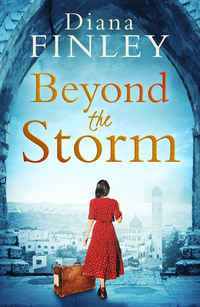
Полная версия
Beyond the Storm
She tries hard to understand Constance, to learn her expectations and fulfil them. Certainly, Constance does not consider it her role to bridge the cultural gulf between them. As Sam’s wife, it is for Anna to adjust to her new situation, to learn the rules. Constance sees herself as keeper of Humphrey’s reputation as a respected GP. She is ever alert to any threat to his position in the community. Anna knows that despite nearly two months of guidance and schooling in social etiquette, Constance finds her a frustratingly slow pupil. How strange it is, this English world of respectability and suppressed outrage.
In Humphrey and Constance’s library Anna finds a copy of Alice in Wonderland. She thinks as a children’s story it will be simple and may help her with colloquial English. The language turns out to be far from simple, yet it fascinates Anna, parodying as it does this very world of saying one thing and meaning something quite different. As she soon learns, Constance is an expert in this field. When by chance they meet a neighbour or acquaintance in the street or in a shop, Constance seems so delighted to see her, so warm and friendly. She admires her outfit, enquires after the health of the husband, enthuses over the achievements of the children. Yet, a few moments later, when they go their separate ways, Constance begins a terrifying assassination. She ‘wouldn’t be seen dead in that suit’; the husband is definitely not ‘top-drawer’ (Anna has to ask Constance to explain these expressions); the children are ill-mannered and dull.
Anna is well aware that she makes Constance anxious, afraid that Humphrey may be shown up by his brother’s strange foreign wife and her unpredictable ways. Anna does not believe Constance dislikes her. In her way, she seems quite fond of Anna, but it is the uneasy affection one might have for a half-trained dog, which though appealing, could at any moment slip its collar and run riot.
Constance and Humphrey continue to entertain whenever they can – ‘after a fashion’ as Constance puts it. Small dinner parties are a regular occurrence at the Lawrence household.
‘It’s important to try to uphold our pre-war standards,’ Constance maintains to Anna as they prepare for one such evening.
Charles and Susan Jennings settle themselves at the table. Anna has met Susan before; Constance had taken her to a ‘coffee morning’ at the Jennings’ house the previous week, where cups of weak coffee had been served, bitter with chicory. Susan is a blonde, middle-aged woman with a pale, washed-out complexion. She has a habit of shaking with little spasms of giggling whenever she makes a contribution to the conversation.
Her husband Charles is Humphrey’s senior partner – a large, noisy, red-faced man. He sits on Anna’s right. As usual, Constance insists on placing Anna at her right-hand side. Anna is aware that this is not to favour her; it is not intended as an honour. On the contrary, Constance feels the need to keep a sharp eye on her, perhaps give her a meaningful prod or surreptitious kick under the table, or whisper advice under her breath. When Anna absently strokes the growing sphere of her belly, Constance indicates her disapproval with an audible exhalation through clenched teeth, accompanied by a hard stare.
Everyone’s attention is on Humphrey, carving a scrawny chicken bestowed on him by a grateful patient. Little gifts like this are not infrequent and are an important supplement to the rations. Charles Jennings leans close to Anna, speaking softly in her ear in a manner both confidential and flirtatious.
‘You look most charming, my dear. Splendid dress. Brightens up this drab weather no end. Just what we all need.’
Anna smiles at his looming face, suddenly uncertain how to respond. She glances round at Constance, who purses her lips and gazes about the table. Is this another of the sarcastic and indirect remarks she finds so confusing? Suddenly she feels that her red dress – so painstakingly sewn on Yael’s machine from a pair of cotton curtains in preparation for her pregnancy – stands out vividly and inappropriately. It is also more suited to the Palestinian climate. She rubs her bare arms. Since arriving in England Anna has suffered constantly from the cold, not so much outside – Sam’s mother has given her a thick woollen coat of her own, and one can put on several layers – but in the damp, unheated houses.
‘Honestly, I don’t know how you two manage it,’ Susan says, with a giggle. ‘Even in these hard times you always put on a splendid table, with everything so smart and spick and span!’
‘Spick and span, eh? I nearly had to come to the dinner table unshaven tonight!’ Humphrey is passing plates to his guests, each with a tiny portion of carved chicken. ‘Not a drop of hot water left.’ Humphrey smiles at Anna in a knowing manner, like a kindly schoolteacher who has caught out a favourite pupil in an unexpected misdemeanour.
‘Oh dear …?’ Anna says sympathetically, even as she senses uneasily that she has not fully understood the significance of the remark. Constance frowns at Humphrey, shaking her head faintly. It is truly a marvel, Anna thinks, how Constance can maintain a rigid smile on her lips, while frowning with the rest of her face.
‘I know you’re still not used to just how scarce the hot water is here,’ Humphrey blunders on. All eyes around the table are now alternating between Humphrey and Anna, as though following a tennis match. ‘I mean, in ordinary times it’s fine to fill the bathtub to the brim, but … er … right now, with fuel shortages … well, there’s not much to go round, is there? But then, how should you know that, eh? No matter though, no matter.’
Humphrey’s remarks hang in the air like a chill fog. Anna is unsure if she is expected to reply, but a hard knot of anger rises in her chest and hammers against her ribs.
‘Humphrey, are you telling me that I used up all the hot water in my bath? Because I think that is very rude of you to say, when I am a guest in your house!’
The high timbre of Anna’s voice remains, like an echo, repeating her last words to the gathering over and over. Humphrey looks aghast at her, his mouth frozen half-open.
‘I dare say you’re right … yes, quite right. I do apologise, Anna. No offence intended,’ he says after a pause.
Constance takes Anna’s hand in hers, as if she means to comfort her. Her plump fingers close around Anna’s wrist in a steely grip.
Anna’s heart is pounding, the sound of it surely filling the room. She longs for Sam. Where is he? Why has he left her with these people? An uncomfortable hiatus is smoothed by the entry of Jenny, the Lawrences’ cook, carrying vegetable dishes that she serves to everyone in turn, oblivious to the atmosphere. Conversation proceeds jerkily for a time. Humphrey winks at Anna across the table. Of course she smiles back. She resolves to speak to him later about the water issue. People here seem to talk in such a roundabout way about important matters, circling the crucial point but never quite articulating it. She is sorry to have upset Humphrey. He seems to be so kindly disposed towards her. But is he? She desperately needs allies. Certainly, she does not want to disturb the newly restored calm. A murmur of conversation rises falteringly from the table.
‘Funny lot, we British, aren’t we, my dear?’ Charles is leaning over to Anna amiably again. ‘So how do you think you are going to like living in England, eh? What do you make of it?’
‘Bloody awful weather,’ she replies without hesitation.
Cutlery stilled, there follows a stunned silence. Anna understands instantly that she has committed another social sin. Charles and Humphrey exchange glances and explode into great snorts of laughter. Susan titters behind her napkin. Constance glares thunderously.
‘Where exactly have you learned such an … idiomatic phrase, Anna?’ Humphrey asks.
‘From the milkman, Humphrey. That is what he said to me this morning, when I opened the door.’ She glances round the table, hoping for some means to redeem the situation. ‘I am trying hard to speak English as it is spoken.’
‘Well done, Anna! Jolly good. You’re certainly learning to speak English as it is spoken!’
‘However,’ Constance adds, ‘it is important to learn from the right class of person, darling.’
* * *
To Anna’s relief, Sam has arranged for her to go into a small private nursing home for the birth of the child. At first she wonders whether Humphrey, as a doctor, expects to attend to her himself – how dreadful that would be. But it turns out he has simply recommended the nursing home as the best in the area. Labour pains start one Sunday afternoon. Constance times the intervals efficiently. Anna’s bag has been packed for some time. Humphrey drives her to the hospital. A receptionist greets them, explains that a room has been booked for Anna and asks if she can manage to walk there. Anna says she can.
‘Better leave you in their capable hands, my dear. Just follow instructions and you’ll be fine. Remember, it’s all been done before. Natural process, and all that. All the best to you. Constance will be in to see you tomorrow, no doubt.’ Humphrey kisses Anna uncertainly on the cheek and turns to go. For a moment Anna almost calls him back, begs him to stay with her.
She has a small private room, very plain, very white. She feels totally alone. A brisk midwife comes in to examine her. She washes her hands and returns to the bed.
‘I was led to believe this was your first child, Mrs Lawrence.’ She studies Anna’s face with a quizzical frown.
‘I’m not sure what you were told. I had … I lost a child. Some years ago.’
‘Ah, yes. I understand.’
Anna looks at her. No, you understand nothing of me. The midwife comes back to examine her again every half hour or so. She offers little further conversation and even less comfort. The pains grow in strength and frequency and Anna is moved to a delivery room next door.
After an agonising, momentous struggle, a boy is born, a beautiful, perfect boy. As Anna holds him, breathes him in, and kisses him, over and over, the tears released become a flood, and will not stop. She is convulsed with weeping. She weeps for all the years gone by, for all that has happened and all that cannot be undone. The midwife clucks disapprovingly and urges her to stop – she should control herself for baby’s sake. It might upset him. She has a fine child and should be grateful. She needs to be calm for baby.
Constance visits them the next day. She admires the baby and hugs Anna and tells her how proud and happy Sam would be. She mentions that she and Humphrey have taken some blankets and cooking utensils to the rented rooms to which Anna and the baby will be moving on leaving hospital. After she goes, Anna spends hours gazing at her sleeping son. The nurses come to show her how to change and bath him. They handle his small body with detached efficiency. The baby abandons himself to their firm hands. He stares at the ceiling light. When being bathed, his fragile limbs stiffen and then relax. Anna is told to ‘put him down’ immediately after his bath or feeding him, to establish a routine. As soon as the nurses leave the room, she picks the baby up and presses him to the hollow of her neck. She inhales his blissful smell. He nuzzles against her and roots around for her breast, his soft mouth open and urgent.
The following day Constance brings Mother to see her new grandson. Mother holds him and kisses his tiny fingers. She looks up at Anna and shakes her head, her expression anxious, as always.
‘He’s so like Samuel as a baby, dear, that same little worried face.’
She unwraps a parcel of exquisite tiny garments she has sewn and knitted. Anna leans forward and embraces her mother-in-law. Mother stiffens in her arms, looking at once alarmed and delighted. Constance says they have wondered what the baby will be called.
‘Sam and I agreed Benjamin for a boy – Ben for short,’ Anna says.
‘Benjamin,’ says Mother. ‘That’s unusual. Is it Jewish?’
Chapter 3
Sam
The behaviour and manner of Dr John Quentin Lawrence reflected the beliefs and attitudes of the Victorian era during which he was raised. Dr Lawrence was respected and trusted, but not greatly liked. He was regarded as a stern and severe man, who believed in hard work and frugality. He married Winifred Wainwright, a parson’s daughter, not for her good looks – she was on the thin side with a long face – but for her humble and compliant demeanour. He knew he would be able to rely on her to make a good doctor’s wife, and to uphold his values.
Despite her complete ignorance of the physical side of marriage until her wedding night, Winifred was pregnant with their first child. She woke early one morning with violent pains, which she knew to be contractions. She breathed quietly, so as not to wake her husband. She bit her lip and dug her fingernails into her palm. When the clock reached quarter to seven, she allowed herself to speak aloud.
‘Good morning, John. The time for the child has come.’
Dr Lawrence opened his eyes and looked at his wife in confusion for a moment. Then he felt a brief flutter of excitement. Dear God, let it be a son. Any further child can be a daughter if it must, but let this be my son. He remembered his list of home calls and sat up.
‘I will ask Alice to fetch Mrs Roly to attend to you. Are you feeling quite well, my dear?’ He was not in the habit of calling Winifred ‘my dear’.
She gasped and doubled up, her body consumed with pain. There was something almost indecent about such a physical experience, one that was totally outside her control. After a few moments she straightened and flexed her shoulders.
‘I believe I am. The pains are quite close together.’
Dr Lawrence regarded Winifred approvingly. It was just like her not to make a fuss.
‘Good, good – then perhaps you won’t have to endure them too long, Winnie.’
Dr Lawrence dressed quickly and rang for Alice. The girl could not conceal her excitement at the task she was given.
‘Ooh, I’ll run all the way to Mrs Roly’s, sir.’
‘All in good time, Alice. Before you go, kindly lay out some breakfast for me. I’m due at my first call shortly.’
Samuel James Lawrence was born some hours later, on 24th March 1902. After the last patient had left his evening surgery, Dr Lawrence paid his wife and first-born son a visit. The small east bedroom had been prepared as a lying-in room. Dr Lawrence was relieved to find that all was clean and neat, and quiet. Winifred was sitting up in bed, brushing her hair. Next to her, the infant was sleeping in a mahogany cradle in which, nearly forty years previously, Dr Lawrence himself had slept.
‘Here he is, John,’ Winifred whispered, ‘here’s our Samuel.’
Dr Lawrence peered into the cradle.
‘Splendid. What a funny little fellow.’
* * *
Sam, his younger brothers Humphrey and Albert, and his sister Freda, grew up in the rambling house on the edge of the village of Stonethwaite in Cumberland. Their father’s surgery occupied half the ground floor. During surgery hours, patients waited on hard wooden chairs in the hallway. There were two consulting rooms: one for Dr Lawrence, large enough for minor operations, and a smaller one for Dr Jasper, his junior partner.
At the back was a small dispensary, where Dr Lawrence made up pills and medicines. Stacked on one shelf were glass bottles of ominously coloured liquids: red, green, and brown, each sealed with a cork. Dr Lawrence was a great believer in the placebo effect for simple country people. These bottles contained nothing but sterilised water, some harmless colouring, and a little alcohol added as a ‘pick-me-up’. His patients swore by them.
‘Ah no, Doctor, not the green one; my Betty takes that. It’s the red one ’as worked wonders for my rheumatism.’
Apart from the kitchen, the house was always cold, even in summer, the sun rarely having time to penetrate the thick stone walls before the chill of evening returned. On the bitterest winter nights a meagre fire smouldered in the sitting room grate. Bedroom fires were lit only on rare special occasions, such as when Freda shivered and quaked with scarlet fever. Winifred was in charge of the running of the house. It was a house looming with heavy dark furniture inherited from an earlier age. Carpets were worn and soft furnishings threadbare.
Sam had no memory of anything new ever being bought for the house. Even shoes were considered an extravagance, and were kept for as long as possible. As the eldest, Sam sometimes had new shoes bought for him, but only when his toes were firmly pressed against the tips. Shoes were patched and mended, their soles and heels reinforced with crescents of metal. When unarguably outgrown, Sam’s shoes eventually passed to Humphrey, and finally to Albert. Sam’s feet caused him problems for the rest of his life.
Meals were bland and simple, in accordance with Dr Lawrence’s taste. He considered that excessive use of seasoning overstimulated the appetite and the senses, and was to be avoided. Each week, Winifred struggled with the domestic budget allowed by her husband. She made careful lists and opted for the cheaper cuts of meat, which were cooked at length in the Aga until reasonably tender, and stretched with turnips, potatoes, barley and suet dumplings. Certain items not absolutely essential were omitted from the shopping until the following week. She supplemented the family diet with produce from a large vegetable and fruit garden. It did not occur to Winifred to suggest that Dr Lawrence might have increased her household allowance. The children always left the table a little hungry.
While they were very small, the children were taught to read and write by their nanny in the nursery. Nanny Lawrence was a kindly spinster of middle years, from whom the children enjoyed occasional demonstrations of affection. When Sam was nine, a governess arrived and introduced him and Humphrey to the rudiments of history, mathematics and French. Two years later Nanny Lawrence disappeared, despite anguished tears shed by Albert and Freda, then aged six and five. At the same time, a tutor was engaged to prepare the older boys for their entrance examinations. He performed his task with rigour, caning Sam and Humphrey viciously across the knuckles for any lack of effort or application.
The austerity of home life prepared Sam well for conditions at boarding school. He expected neither comfort nor affection, and received none. The battlefields of France and Belgium were rapidly absorbing a generation of young men. Many of Sam’s teachers were old men or survivors of the war, returning damaged and embittered, and resenting their pupils’ untouched youth and opportunity.
Despite its harshness, Sam’s childhood was not without pleasure. His father’s work meant he was rarely present at home, except when occupied in the surgery. The children were expected to entertain themselves, when not actively engaged in schoolwork. They roamed the hills and country freely on foot and by bicycle, slabs of bread and cold tea packed into knapsacks. Sam often helped his mother in the vegetable garden. She was not a talkative woman, but he sensed her quiet fondness for him as they worked side by side, planting lines of potatoes, turnips and carrots.
‘Well done, Samuel. By autumn we’ll be enjoying these.’
When Sam reached the age of seventeen, Dr Lawrence called him into his study for a discussion about his future.
‘Are you considering medicine, Samuel? I have contacts at St Thomas’s, you know. I’m sure they’d take you on, as long as you don’t make a mess of matriculation. It’s a fine profession.’
‘I don’t think I’m really cut out to be a doctor, Father. Not like Humphrey.’
‘Not cut out for it? I don’t know about that. That seems a somewhat flippant way to refer to your future. You do realise we can’t send you all to university, don’t you? If you don’t want to pursue medicine, have you thought about the other options? There’s law or there’s the army.’
Sam longed to escape the constraints of his life. He longed to see the wider world. In 1922, he became one of the youngest officers to graduate from Sandhurst. Dr Lawrence and Sam’s godfather – an uncle in Ireland – shared in paying for his commission, with money long set aside for just such an eventuality.
His first posting was to Ireland. It was not the exotic setting he might have hoped for, but he liked the Irish, and recognised that history had dealt them a poor hand. His commanding officer warned him against this view.
‘Be careful, Lawrence. It’s a mistake to try to see both sides of the argument – or to consider the argument at all for that matter. Our job is to keep order, nothing more. Keep out of the politics.’
In Ireland Sam learned that great charm was not incompatible with extreme brutality. There was a spate of house burnings by the Black and Tans, after which the IRA considered what reprisals against the Protestants might be appropriate. IRA leaders of the local Brigade felt it would be unjust to burn the homes of people not involved directly in anti-Catholic acts. Instead they decided to target Leindown Castle, residence of Lord and Lady Tullycomb. Lord Tullycomb was a member of the British House of Lords and a determined opponent of Irish National aspirations. British officers sometimes stayed at the Castle, and officers from the local garrison – including Sam – were occasional visitors there.
The IRA also selected Leindown for its history of devout Unionism and its longstanding links with the British establishment. At the time of the attack, Lord Tullycomb was away in Scotland on a fishing trip. The only occupants of the Castle were Lady Tullycomb, her daughter Hester, and five servants. The Castle and most of its contents were burnt to the ground in the raid, but no one was harmed.
Sam participated in the subsequent military investigation. He was impressed by Lady Tullycomb’s steadfast refusal to identify the attackers, saying only that they had ‘behaved like gentlemen’. She informed the military that she and Hester had been allowed to identify some of their most treasured possessions, and then ten IRA men had been assigned to carry these objects out of the house. Two armchairs had also been taken outside for herself and Hester to sit in safety and comfort. Sam noted that these chairs were placed in the rose garden, where the women would be sheltered from the sight of their home being destroyed, and where the smell of burning might be masked by the fragrance of the blooms. He was ordered to remove these references from his report, his commanding officer being concerned that the true criminality of the act should not be disguised.
On another occasion, Sam was cycling back to his base following a match at the nearby tennis club, when he rounded a corner and stumbled upon an IRA ambush. A general – a highly decorated hero of the First World War – and his friend, a colonel, together with their wives, were driving in the other direction, in order to play tennis themselves. Seeing signs of an ambush ahead, and unable to turn the car around in time, the general accelerated the car in a desperate attempt to escape. The ambushers opened fire with revolvers, rifles and shotguns, killing the general and the colonel’s wife instantly. The car swerved sideways and crashed into a ditch.
Sam was nearly upon them. He witnessed the event, but was unable to intervene or escape the notice of the attackers. He had no option but to continue cycling. As he reached the rebel road block, unarmed and vulnerable in his white shorts and shirt, he waved his tennis racket in the air. The IRA men, respecting a sportsman, shook their heads and allowed him through unharmed, before making their escape without further bloodshed.
Sam was able to summon help for the injured survivors of the ambush. He was genuinely surprised when his advance through the site of the attack was later referred to as an act of heroism. He had been confident that the rebels had nothing to gain by targeting him too and, in any case, felt he had no alternative but to proceed. Sam’s gentle and courteous manner endeared him to all sides of the conflict. Over time he gained a reputation for being a fair and effective negotiator.






